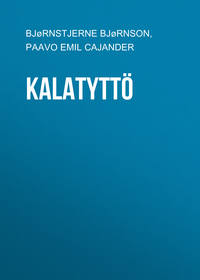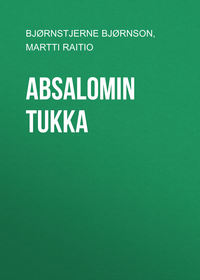 полная версия
полная версияMagnhild; Dust
The next day the girls passed every free moment in the dining-room, which had now been transformed into a work-shop. The saddler told them of a sojourn of several years in America, and of travels in England and Germany; he talked without interrupting his work and with a frequent intermingling of jests. His narratives were accompanied by the incessant tittering of his listeners. They were scarcely aware themselves how they gradually ceased laughing at him and laughed instead at the witty things he said; neither did they observe until later how much they learned from him. He was so greatly missed by the girls when he left that more than half of their time together was occupied in conversation about him; this lasted for many days after he was gone, and never wholly ceased.
There were two things which had made the strongest impression on Magnhild. The first was the English and German songs the saddler had sung for them. She had paid little attention to the text, unless perhaps occasionally; but how the melodies had captivated her!
While singing hymns one Sunday they had first noticed that Skarlie had a fine voice. Thenceforth he was obliged to sing for them constantly. These foreign melodies of his fluttering thither from a fuller, richer life, freer conditions, larger ideas than their own, clung to Magnhild's fancy the entire summer. They were the first pictures which had awakened actual yearning within her breast. It may also be said that for the first time she comprehended what song was. As she was singing her interminable scales one day, before beginning her studies in singing from note, she came to a full realization of the fact that this song without melody was to her like wings beating against a cage: it fluttered up and down against walls, windows, doors, in perpetual and fruitless longing, aye, until at last it sank like the cobwebs, over everything in the room. She could sit alone out of doors with his songs. While she was humming them, the forest hues dissolved into one picture; and that she had never discovered before. The density, the vigor in the tree-tops, above and below the tree-tops, over the entire mountain wall, as it were, overwhelmed her; the rushing of the waters of the stream attracted her.
The second thing which had made so deep an impression on her, and which was blended with all the rest, was Skarlie's story of how he had become lame. In America, when he was a young man, he had undertaken to carry a boy twelve years old from a burning house; he had fallen with the boy beneath the ruins. Both were extricated, Skarlie with a crushed limb, the boy unscathed. That boy was now one of the most noted men of America.
It was his lot to be saved, "he was destined to something."
This reminder again! The thought of her own fate had heretofore been shrouded in the wintry mantle of the churchyard, amid frost, weeping, and harsh clanging of bells; it had been something sombre. Now it flitted onward to large cities beyond the seas, among ships, burning houses, songs, and great destinies. From this time forth she dreamed of what she was destined to be as something far distant and great.
CHAPTER III
Late in the autumn all three girls were confirmed. This was such a matter of course to them all that their thoughts were chiefly busied with what they should wear on the day of the ceremony. Magnhild, who had never yet had a garment cut out and made expressly for herself, wondered whether an outfit would now be prepared for her. No. The younger girls were furnished with new silk dresses; an old black dress that had become too tight for the priest's wife was made over for Magnhild.
It was too short both in the waist and in the skirt; but Magnhild scarcely noticed this. She was provided by the governess with a little colored silk neckerchief and a silver brooch; she borrowed the every-day shawl of the mistress of the house; a pair of gloves were loaned her by the governess.
Her inner preparations were not much more extensive than the outer ones.
The day glided tranquilly by without any special emotion. Religious sentiments at the parsonage, as well as elsewhere in the parish, were matters of calm custom. Some tears were shed in church, the priest offered wine and a toast at table, and there was a little talk about what should now be done with Magnhild. This last topic so affected Magnhild that after coffee she went out and sat down alone. She gazed toward the broad rocky path of the land-slide on the verdure-clad mountain, then toward the mighty mass of débris in the midst of the plain, for it was there her home had stood.
Her little brothers and sisters appeared before her, one fair, bright face after another. Her mother came too; and her melancholy eye dwelt lingeringly on Magnhild; even the lines about the mouth were visible. The fine psalm-singing of her mother's gentle voice floated around Magnhild now. There had been sung in church that day one of the hymns her mother used to sing. Once more, too, her father sat on the bench, bowed over the silver work in which he was a master. A book or a newspaper lay at his side; he paused in his work now and then, stole a glance at the page before him, or turned a leaf. His long, delicately cut face inclined occasionally toward the family sitting-room and its inmates. The aged grandparents formed part of the home circle. The grandmother tottered off after some little dainty for Magnhild, while the old grandfather was telling the child a story. The dog, shaggy and gray, lay stretching himself on the hearth. His howl had been the last living sound Magnhild had heard behind her as she was carried downward across the stream. The memory of that awful day once more cast over her childhood the pall of night, thunder, and convulsions of the earth. Covering her face with her hands, she burst into tears.
The saddler's ballads came floating toward her, bringing a sense of want with their obscure dream images. And there drifted past her a motley throng of those half-comprehended songs and the anecdotes upon which she had often placed false interpretations, until, exhausted by the thoughts, emotions, and yearnings of the day, with an aching void within and a dull feeling of resignation, she feel asleep.
In the evening Rönnaug, with whom they had become acquainted during the confirmation instructions, made her appearance; she was out at service in the neighborhood and had a holiday in honor of the occasion. She brought with her a whole budget of gossip concerning the love affairs of the parish, and the inexperienced girls sat with wondering eyes listening. It was she who caused the youngest girl to tear her new silk dress. Rönnaug could roll down hill with such incomprehensible speed that she was induced to repeat the feat several times, and this finally led the priest's daughter to try her skill.
Hereafter Rönnaug often dropped in of an evening when her work was done. They all took delight in her wild exuberance of spirits. She was as hearty and as plump as a young foal; she could scarcely keep the clothes on her back because she was all the time tearing them to tatters, and she had never-ceasing trouble with her hair, which would keep falling over her face because she never had it done up properly. When she laughed, and that was nearly all the time, she tossed back her head, and through two rows of pearly teeth, white as those of a beast of prey, could be seen far down her throat.
In the autumn Skarlie came again. There was a difference between the reception now given him and the former one. The three girls surrounded his sledge, they carried in his luggage, notwithstanding his laughing resistance, their laughter accompanied him as he stood in the passage taking off his furs.
Questions without number were showered like hail upon him the first time they sat with him in the work-room; the girls had an accumulation of treasured-up doubts and queries about things he had told them on his previous visit, and many other perplexing themes which they considered him able to solve. On very few topics did Skarlie hold the prevailing opinions of the parish, but he had a way of deftly turning the subject with a joke when pressed too closely for his precise views. When alone with Magnhild he expressed himself more freely; at first he did so cautiously, but gradually increased his plainness of speech.
Magnhild had never viewed her surroundings with critical eyes; she would now laugh heartily with Skarlie over the priest's last sermon, or his indolent life; now over the spider-like activity of the mistress of the house, because it was all described so comically. At the "fat repose" of the governess, even at the "yellow, round heads" of her young friends, Magnhild could now laugh; for the humor with which everything was delineated was so surprisingly original; she did not perceive that this jesting was by degrees undermining the very ground she stood upon.
The quite usual amusement in the country of teasing a young girl about being in love was, meanwhile, directed rather unexpectedly toward Magnhild; she was called "the saddler's wife," because she passed so much time in his society. This reached Skarlie's ears and immediately he too began to call her his "wife," his "tall wife," his "blonde wife," his "very young wife."
The following summer the priest's daughters went to the city for increased opportunities of culture. The governess remained "for the present" at the parsonage.
The saddler came once more in the autumn to complete his work. Magnhild was now, of course, more frequently alone with him than before. He was merrier than ever. One joke that was often repeated by him was about journeying round the world with "his young wife." They met with an immense number of traveling adventures, and they saw many remarkable sights, all of which were so accurately described by Skarlie that they attained the value of actual experiences. But the most ludicrous picture he drew represented the two tramping through the country: Skarlie limping on before with a traveling satchel, Magnhild following in a waterproof cloak and with an umbrella in her hand, grumbling at the heat, dust, and thirst, weary and heartily disgusted with him Then, having reached their journey's end, they rested in Skarlie's little home in the little town, where Magnhild had everything her own way and lived like a princess all the rest of her life.
It would be impossible to describe the countenance of the priest when the saddler appeared in his study one evening, and taking a seat in front of him asked, after a few cordial, pleasant remarks by way of introduction, whether the priest would object to his marrying Magnhild. The priest was lying on the sofa smoking; his pipe dropped from his mouth, his hand sank with it, his fat face relaxed until it resembled a dough-like mass, in which the eyes peeped forth as wholly devoid of thought as two raisins; suddenly he gave a start that set a quantity of springs beneath him to creaking and grating, and the book that lay upside down on his knee fell. The saddler picked up the volume smiling, and turned over the leaves. The priest had risen to his feet.
"What does Magnhild have to say to this?" asked he.
The saddler looked up with a smile.
"Of course I should not have asked if she were not likely to give her consent," said he.
The priest put his pipe in his mouth, and strode up and down the floor, puffing away. Gradually he grew calmer, and without slackening his speed, he observed: —
"To be sure I do not know what is to become of the girl."
Once more the saddler raised his eyes from the book whose leaves he was turning over, and now laying it aside, he remarked: —
"It is, you know, rather a sort of adoption than a marriage. Down yonder at my house she can develop into whatever she pleases."
The priest looked at him, took a puff at his pipe, paced the floor, and puffed again.
"Aye, to be sure! You are, I believe, a wealthy man?"
"Well, if not precisely wealthy, I am sufficiently well provided to get married."
Here Skarlie laughed.
But there was something in his laugh, something which did not quite please the priest. Still less did he like the tone of indifference with which Skarlie seemed to treat the whole affair. Least of all did he like being so taken by surprise.
"I must speak with my wife about this," said he, and groaned. "That I must," he added decidedly, "and with Magnhild," came as an afterthought.
"Certainly," said the other, as he rose to take leave.
A little while later, the priest's wife was sitting where the saddler had sat. Both hands lay idly open on her lap, while her eyes followed her spouse as he steamed back and forth.
"Well, what do you think?" he urged, pausing in front of her.
Receiving no reply, he moved on again.
"He is far too old," she finally said.
"And surely very sly," added the priest, and then pausing again in front of his wife, he whispered: "No one really knows where he comes from, or why he chooses to settle here. He might have a fine workshop in a large city – wealthy, and a smart dog!"
The priest did not use the choicest language in his daily discourse.
"To think she should allow herself to be so beguiled!" whispered the wife.
"Beguiled! Just the word – beguiled!" repeated the priest, snapping his fingers. "Beguiled!" and off he went in a cloud of smoke.
"I am so sorry for her," remarked the wife, and the words were accompanied by a few tears.
This touched the priest, and he said: "See here, mother, we will talk with her, both of us!" then strode heavily on again.
Ere long Magnhild stood within the precincts of the study, wondering what could be wanted of her. The priest was the first to speak: —
"Is it really true, Magnhild, that you have agreed to be the wife of this fellow, the saddler?"
The priest often used the general term "fellow" instead of a proper name.
Magnhild's face became suffused with blushes; in her whole life she could never have been so red before. Both the priest and his wife interpreted this as a confession.
"Why do you not come to us with such things?" asked the priest, in a vexed tone.
"It is very strange you should act so, Magnhild," said the mistress of the house, – and she wept.
Magnhild was simply appalled.
"Do you really mean to have him?" asked the priest, pausing resolutely in front of her.
Now Magnhild had never been accustomed to being addressed in a confidential tone. When questioned thus closely she had not the courage to give a frank statement of all that had occurred between her and Skarlie, telling, how this talk of marriage had commenced as a jest, and that although later she had had a misgiving that it was becoming serious, it was so continually blended anew with jests that she had not given herself the trouble to protest against it. How could she, with the priest standing thus before her, enter on so long a story? And so instead she burst into tears.
Well now, the priest did not mean to torment her. What was done could not be undone. He was very sorry for her, and in the goodness of his heart merely wanted to help her lay a solid foundation to her choice. Skarlie was a man of considerable means, he said, and she a poor girl; she certainly could not expect a better match, so far as that went. True, Skarlie was old; but then he had himself said that he designed rather a sort of adoption than a marriage; his only object was Magnhild's happiness.
But all this was more than Magnhild could bear to listen to, and so she rushed from the room. In the passage she fell to crying as though her heart would break; she was obliged to go up to the dark garret in order to avoid attracting attention, and there her grief gradually assumed definite shape. It was not because the saddler wanted her that she was in such distress; it was because the priest and his wife did not want her.
This was the interpretation she had put on their words.
When the governess was informed of the affair she differed entirely from the mistress of the house, who could not comprehend Magnhild, for the governess could comprehend the young girl perfectly. Skarlie was a man of fine mind and very witty. He was rich, jovial, rather homely, to be sure, but that was not of such great consequence down at the Point. And she adopted this tone in talking with Magnhild when she finally succeeded in getting hold of her. Magnhild was red with weeping, and burst into a fresh flood of tears; yet not a word did she say.
Somewhat curtly the priest now informed the saddler that as the matter was settled he might as well proceed with the preparations. The saddler desired this himself; moreover, he was now quite through with his work. Eagerly as he strove for an opportunity to speak with Magnhild, he even failed to catch a glimpse of her. He was therefore forced to take his departure without having an interview with her.
During the days which followed Magnhild neither appeared in the sitting-room nor at table. No one attempted to seek her and talk with her; the governess deemed it quite natural that in the face of so serious a step the young girl should wish to be alone.
One day the members of the household were surprised by the arrival through the mail of a letter and large package for Magnhild. The letter read as follows: —
In order to complete our delightful joke, dear Magnhild, I came down here. My house has been painted this summer, within and without, a joke which now almost looks like earnest – does it not?
Beds, household furniture, bedding, etc., are articles that I deal in myself, so these I can purchase from my own stores. When I think of the object I have in view, this becomes the most delightful business transaction I have ever entered into.
Do you remember how we laughed the time I took your measure in order to prove accurately how much too short in the waist your dress was, how much too wide across the shoulders, and how much too short in the skirt? Just by chance I took a note of your exact measurement, and according to it I am now having made: —
1 black silk dress (Lyons taffeta).
1 brown (cashmere).
1 blue (of some light woolen material).
As I have always told you, blue is the most becoming color that you can wear.
Such orders cannot be executed without some delay; but the articles shall be sent as speedily as possible.
For other garments that you may perhaps require I telegraphed to Bergen immediately upon my arrival here; such things can be obtained there ready-made. You will most likely receive them by the same mail which brings you this letter.
As you see (and shall further continue to see), there are sundry jokes connected with this getting married. For instance, I made my will to-day, and in it designated you as my heiress.
With most respectful greetings to the priest and his honored family, I now subscribe myself
Your most obedient jester,Skarlie.Magnhild had taken refuge in the garret, with both the letter and the large package. She had plunged forthwith into the letter, and emerging from its perusal perplexed and frightened, she tore open the package and found many full suits of everything pertaining to feminine under garments. She scattered them all around her, blushing crimson, angry, ashamed. Then she sat down and wept aloud.
Now she had courage to speak! She sprang down-stairs to the priest's wife, and throwing her arms about her neck, whispered, "Forgive me!" thrust the letter into her hand, and disappeared.
The priest's wife did not understand Magnhild's "Forgive me!" but she saw that the young girl was crying and in great excitement. She took the letter and read it. It was peculiar in form, she thought; yet its meaning was plain enough: it indicated a sensible, elderly man's prudent forethought, and deserved credit. An old housewife and mother could not be otherwise than pleased with this, and she carried the letter to the priest. It impressed him in the same way; and he began to think the girl might be happy with this singular man. The mistress of the house searched everywhere for Magnhild, in order to tell her that both the priest and herself were of the opinion that Skarlie's conduct promised well. She learned that Magnhild was in the garret, and so throwing a shawl round her (for it was cold) she went up-stairs. She met the governess on the way and took her with her. Magnhild was not visible; they saw only the articles of clothing strewn over floor, chests, and trunks. They collected these together, discussed them, examined them, and pronounced them admirable. They well knew that such a gift was calculated to embarrass a young girl; but then Skarlie was an elderly man whose privilege it was to take things in a fatherly way. This they told Magnhild when they finally found her. And she had no longer the courage to be confidential. This was because the priest's wife, sustained by the governess, spoke what they deemed sensible words to her. They told her that she must not be proud; she must remember that she was a poor girl who had neither relatives nor future of her own. In the days which followed, Magnhild fought a hard fight in secret. But she lacked energy for action. Where could she have gained it? Where could she go since the priest's family had so evidently grown tired of her?
A little later there arrived a chest containing her dresses and many other articles. Magnhild allowed it to stand untouched, but the governess, who so well understood this bashfulness, attended to having it opened. She and the priest's wife drew forth the contents piece by piece, and not long afterwards Magnhild was trying on dress after dress before the large mirror in the family sitting-room. The doors were locked, the priest's wife and the governess full of zeal. Finally they came to the black silk dress, and Magnhild gradually ceased to be indifferent. She felt a blushing gratification in beholding in the glass her own form encompassed in beautiful fine material. She discovered herself, as it were, point by point. If it chanced to be the face, she had not before this day so fully observed that those she beheld at her side were without distinct outline, while hers – Her vision had been rendered keen by the sense awakened, in the twinkling of an eye, by a handsome, well-fitting garment.
This picture of herself floated before her for many days. Fearing to disturb it she avoided the mirror. Once more she became absorbed in the old dreams, those which bore her across the sea to something strange and great.
But the marriage? At such moments she thrust it from her as though it were a steamer's plank, to be drawn ashore after serving its purpose. How was this possible? Aye, how many times in the years that followed did she not pause and reflect! But it always remained alike incomprehensible to her.
She could neither be persuaded to put on one of the new dresses the day Skarlie came, nor to go out to meet him; on the contrary, she hid herself. Later, and as by chance, she made her appearance. With unvarying consistency she treated both the marriage and Skarlie as though neither in the least concerned her.
Skarlie was in high spirits; the fact was both the priest and his wife took pains to make amends for Magnhild's lack of courtesy, and he reciprocated in the most winning manner. The governess declared him to be decidedly amiable.
The next evening Magnhild sat in the dining-room arranging some articles belonging to the industrial school that must now be sent back. She was alone, and Skarlie entered softly and smiling, and slowly closing the door behind him took a seat at her side. He talked for some time on indifferent subjects, so that she began to breathe freely again; she even ventured at last to look down on him as he sat bent over smoking. Her eyes rested on the bald head, the bushy brows, and the extreme end of the snub-nose, then on his enormous hands and their very singular-looking nails; the latter were deeply set in the flesh, which everywhere, therefore in front also, encompassed them like a thick round frame. Under the nails there was dirt, a fact to which the governess, who had herself very pretty hands, had once called the attention of her pupils as a deadly sin. Magnhild looked at the reddish, bristling hair which completely covered these hands. Skarlie had been silent for a little while, but as if he felt that he was being scrutinized, he drew himself up, and with a smile extended to her one of his objectionable hands.
"Aye, aye, Magnhild!" said he, laying it on both of hers. This gave her a shock, and in a moment she was like one paralyzed. She could not stir, could not grasp a single thought except that she was in the clutches of a great lobster. His head drew nearer, the eyes too were those of a lobster; they stung. This she had never before observed, and she sprang hastily to her feet. He retained his seat. Without looking back Magnhild began to busy herself where she stood with another lot of the industrial work. Therefore she did not leave the room, but a little while later Skarlie did.









